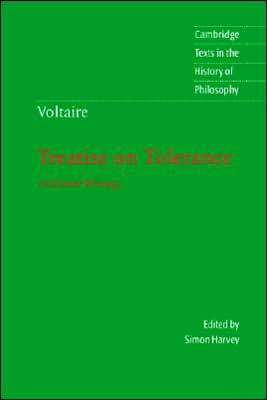

 |

|

The average rating for Treatise on Tolerance and Other Writings based on 2 reviews is 4.5 stars.
Review # 1 was written on 2017-06-07 00:00:00 carlos rodriguez carlos rodriguez"Il faut donc que les hommes commencent par n'être pas fanatiques pour mériter la tolérance." Voltaire's treaty on tolerance is as brilliant as it is educating. In its core message, it has the same stringency and power today as two and a half centuries ago, when he wrote it. Knowing the effect of writing or talking freely in an oppressively unified environment (political or religious or both), anyone can imagine the bravery of standing up to the evils of one's own society, one's own religion. It is easy enough to criticize other religions and their followers, and the easiest thing in the world to dismiss atheists as lacking depth, imagination and spiritual intelligence, but to stand up among the people with whom you share a cultural background, and call out to them to be tolerant, respectful and open-minded towards other religions and atheists, when you have seen the dangerous effects of free-thinking in courts, in neighbourhoods, in churches, - that requires courage. Voltaire risked more than an impolite or insulting answer when he wrote to tell his Catholic countrymen to let their god take care of the punishment of so-called "heretics" if s/he didn't approve of the kind of worship the protestants had chosen. If god is divine, so Voltaire's thought, s/he doesn't need humans to be judges on divine matters. S/he is perfectly capable to punish people him/herself, should s/he really consider that adequate. If s/he is not divine, it is implicitly understood, people should most definitely not kill each other because they have different opinions on rituals and theological discourses. His essay is strictly focused on achieving justice for the family Calas, whose treatment by French justices and priests had shaken Voltaire and the intellectual Paris society to move into action. Carefully arguing for tolerance, he takes a theist and monarchist position, and cites from historical sources to point out the evidence for successful tolerance in ancient and contemporary societies. His idea of co-habitation would probably not be enough for a human rights supporter of today, as he clearly grants the dominating religion more privileges than other lifestyles. But looking back on two centuries of continued massacres in France, a first step towards peaceful respect seems both reasonable and laudable. Erudite, witty, focused on the result, Voltaire shows his humanity in his hard work for justice, too often obstructed for reasons of politics or faith. His willingness to speak up and declare solidarity with an oppressed family is still inspiring, as is his irony and delightful prose! I dare to claim his arguments are well worth reading, even if you do not happen to be a theist monarchist. He doesn't believe in the right to absolute, exclusive truth. He believes in open discussion! A lively example of humanity at work! |
Review # 2 was written on 2014-09-07 00:00:00 Daniel Alfano Daniel AlfanoAn impassioned plea for religious tolerance by Voltaire, triggered by the execution of Jean Calas in Toulouse. Jean Calas was a Protestant merchant in Toulouse who was sentenced to death for the murder of his son. All the evidence pointed to suicide by hanging and Calas was a frail man who would not have had the strength to murder his son in this way. Calas was sentenced to be broken at the wheel, a particularly brutal form of execution. Voltaire heard about the cause and took up the cause for a posthumous pardon and compensation for the remaining family. It was a long battle and this treatise is part of the campaign. The treatise is a run through of recent French history in relation to tolerance and especially the persecution of the Huguenots. Voltaire proceeds to look at Christian history, the early Church Fathers, the Bible, other religions and the ancient Greeks and Romans. Throughout Voltaire emphasises his own Christian credentials as a good Catholic; but his arguments, caustic wit and sheer scepticism point to him being distant from religious belief, or as much as he could be at the time. He is essentially a Deist. Voltaire treats the reader to an entertaining run through some of the battier beliefs of the early church and examines the persecution by the Romans to show that this has been exaggerated and most of the time the church went out of its way to attract persecution. He also contrasts the bloodthirstiness of the Old Testament with the more tolerant approach of the New Testament. Of course Voltaire continues to make the point that if you are right you don't need to persecute, just persuade. He also shows a preference for Eastern religions as opposed to the Religions of the Book (Judaism, Christianity and Islam). This is a very humane book, baffled by the inhumanity of the Church and arguing for the toleration and free thought. It feels very modern. |
CAN'T FIND WHAT YOU'RE LOOKING FOR? CLICK HERE!!!